WHAT IS AN ARTWORK? CATALOGUE: MARCELLVS L. BERLIN 2008. EXCERPT

of truth is supposed to take place. Later on, in Being and Time (especially in Section 44), Heidegger dislocates the locus of truth in relation to the category of the proposition or propositional logic and thus puts the primacy of propositional logic over philosophy into question. For Heidegger, the locus of truth is not the proposition, but rather, the proposition itself belongs to a space of truth, i.e. to that which he calls "openness". There must already be a “relationship to being”, as Heidegger says, between the subject of the proposition and its objects, the objects of knowledge (according to epistemological theory). A relation of being, an "understanding of being on the part of human existence" must have already taken place before one can speak of this relation of knowledge and its connection in the proposition. In Heidegger there is a kind of deepening of traditional metaphysics of knowledge in the opening of the relation of knowledge to this ontological a priori of a relationship to being prior to it. What is persuasive in his analyses is this tearing of philosophy out of the primacy of the metaphysics of knowledge or epistemology.
Heidegger's existential ontology is also the explicit attempt to oppose neo-Kantian thinking, contradicting the defusing of philosophy in its reduction to epistemology. One can think of the great tradition of German idealism, Kant, Fichte, Schelling, Hegel: a tradition in which the relationship between epistemology and general ontology is exemplified. It would be too little to simply ascribe this tradition to a philosophy of knowledge. The question concerning the limits of knowledge of the human subject is already a question concerning the subject's being as a being conscious of knowledge and a being conscious of self, a question which opens itself to the ontological tornness of the human subject as evoked already in the first sentence of the first edition of the Critique of Pure Reason. One of Heidegger's important achievements was not to accept the reduction of philosophy to epistemology in order to situate epistemology or to dislocate it into that which he, in turn, calls truth or openness or aletheia, as the space of disclosedness in which the relationship of being between human existence and that which is, beings, has already taken place. Obviously it is a matter of this ‘already’, of a kind of a priori, of a certain ‘earlier’ that proceeds the relationship of knowledge as its transcendental condition. As everybody knows, in philosophy transcendental means something like enabling. When Kant speaks of the transcendental subject, of the being of the human being as transcendental subjectivity, then transcendental means that structures can be found in the subjectivity of the subject that enable its relationship to its self and to the world. That is the sense of the word transcendental in Kantian terminology.
As opposed to the Thomist concept of truth that reduces truth to propositional logic, and as opposed to Heidegger's concept of truth that determines human existence as an existence understanding being, as being-in-the-world, I want to propose a third concept of truth. In his critical engagement with Descartes (who, in a classical, almost Platonic separation of the subject's body from its status as ego cogito, as
thinking ego, proceeds from a dualistic metaphysics), Heidegger answered the Cartesian dilemma, "How do I get the cogito out into the world?" in the following way: "I do not have to get it out at all because it is already out there". The human cogito is original ecstasy, originary transcendence to the dimension of the world, as Heidegger calls it, the world or also the openness of being-in-the-world. The only point where I have trouble with Heidegger here is that the determination of human being as being-in-the-world implies a privileging of this relationship insofar as the human subject, human existence as being-in-the-world, is almost seamlessly embedded in its world. According to Heidegger, being-in-the-world is the fundamental structure of human existence. As originary being-in-the-world, human existence, or Dasein, is at home in the world, no matter how much Heidegger also speaks of not being at home and of unhomeliness (no matter how much he also concedes that being at home is derivative of being not at home). Ultimately, the analysis of Dasein privileges the character of familiarity as opposed to the eery mode of unhomeliness in the world, since the world is Dasein's sphere of openness in which it moves as if in its element. Even though truth as disclosedness reaches back into hiddenness, even though being is thought as withdrawal, Heidegger insists on a vocabulary of one's own and of one's own authenticity that promises Dasein a kind of ontological home. Against this ontology of home, I want to define truth as the limit of the universe of facts, as the limit of that which Heidegger calls the world, the limit of this interconnection of usefulness in which Dasein articulates its self-evident relations to the world and to itself within the life-world. I call truth that which cannot be positivized any further, which does not allow any kind of positivity in the space of constituted realities, in the dimension of facts. One could also say, putting a point on it: truth is that which does not exist.
